Find Help
More Items From Ergsy search
-

Heavy periods (heavy menstrual bleeding)
Relevance: 100%
-

Irregular periods - BSL
Relevance: 33%
-
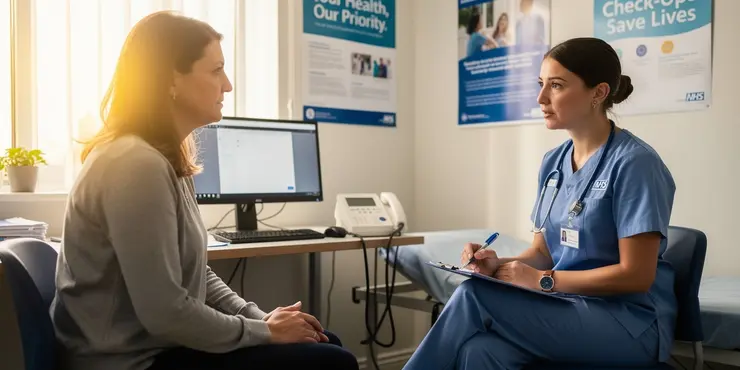
Can the test be performed during my menstrual period?
Relevance: 33%
-

What you need to know about irregular periods
Relevance: 30%
-

Can I use Ibuprofen for menstrual pain?
Relevance: 27%
-

What should I do if I start bleeding during early pregnancy? | NHS
Relevance: 27%
-

What should I do if I experience severe pain or bleeding after the test?
Relevance: 24%
-
Bleeding from the bottom rectal bleeding
Relevance: 24%
-
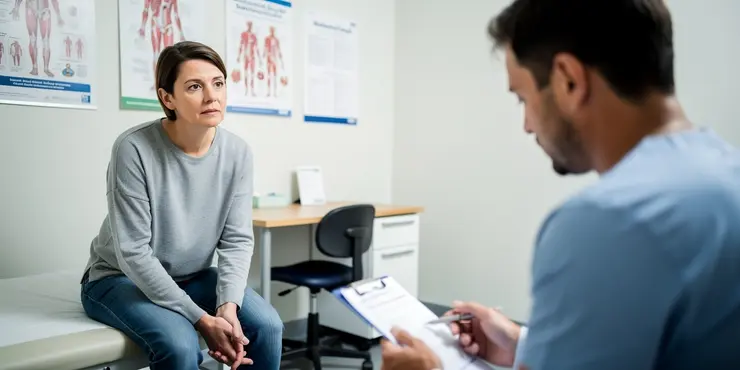
Bleeding from the bottom rectal bleeding
Relevance: 24%
-

Will the test affect my menstrual cycle?
Relevance: 23%
-

How to deal with period pain | NHS
Relevance: 22%
-

Post Menopausal Bleeding Clinic | A Guide to What Happens at An Appointment
Relevance: 21%
-

Period pain (dysmenorrhoea) - BSL
Relevance: 21%
-

What should I avoid doing during the recovery period?
Relevance: 21%
-

How to deal with period pain | NHS
Relevance: 20%
-
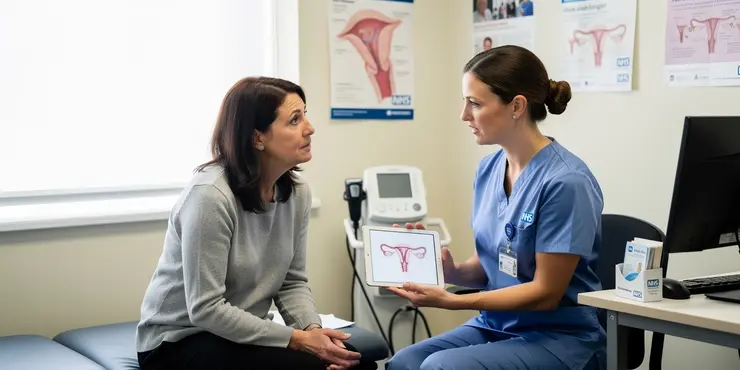
Are there any risks associated with the womb lining test?
Relevance: 20%
-

What is the Womb Lining test?
Relevance: 19%
-

Having a hysteroscopy as an outpatient (English)
Relevance: 19%
-
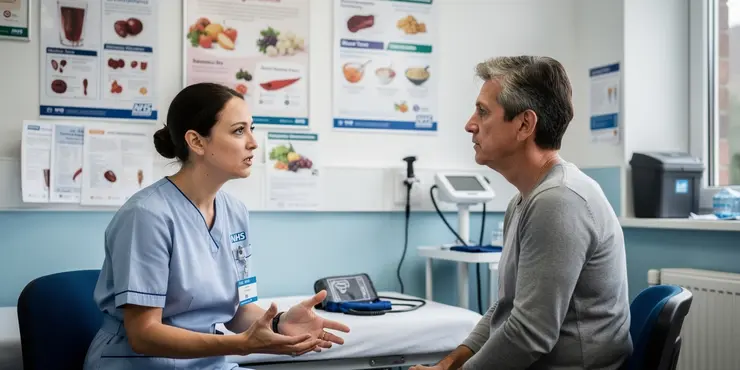
What is Anaemia (iron deficiency)?
Relevance: 19%
-

What happens after a womb lining test?
Relevance: 18%
-

How to deal with period pain | NHS
Relevance: 17%
-

How to deal with period pain | NHS
Relevance: 17%
-

Finding out about Fibroids - information for patients
Relevance: 16%
-

Why is a womb lining test performed?
Relevance: 15%
-

How to treat a nosebleed | NHS
Relevance: 15%
-

Are there risks associated with a womb lining test?
Relevance: 15%
-

What is the notice period for redundancy?
Relevance: 14%
-
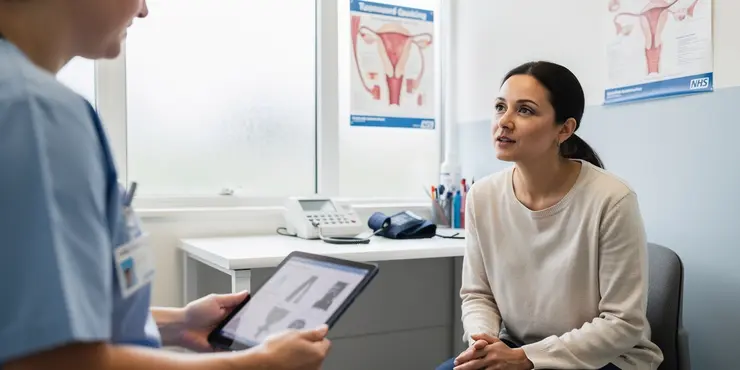
How should I prepare for a womb lining test?
Relevance: 13%
-
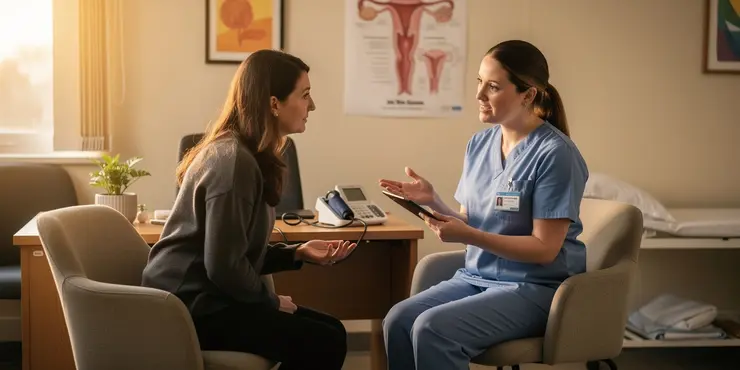
Is a womb lining test painful?
Relevance: 13%
-

What causes iron deficiency anemia?
Relevance: 13%
-

Has the notice period for eviction changed?
Relevance: 13%
-
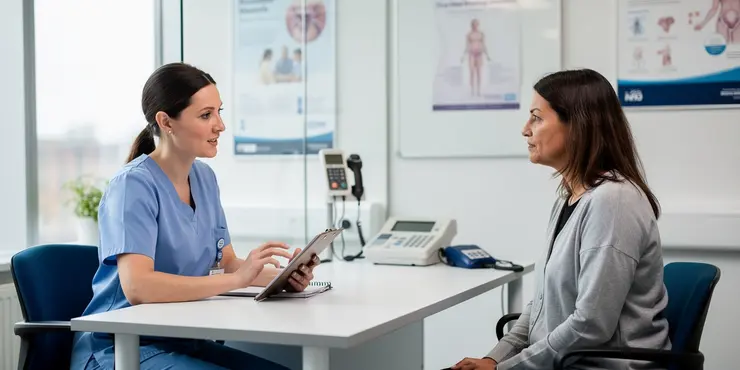
Is the womb lining test painful?
Relevance: 12%
-
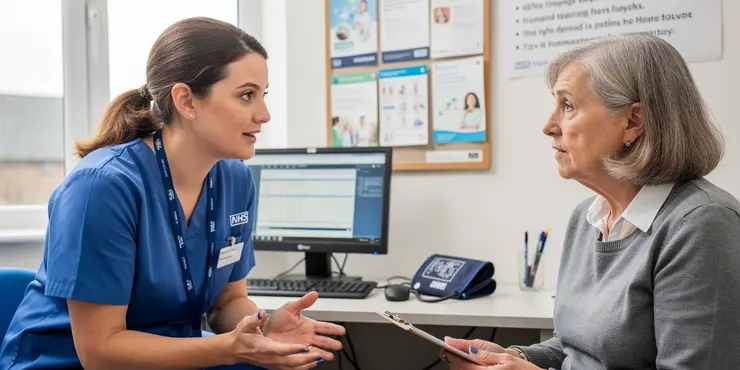
How long is the incubation period for the Marburg virus?
Relevance: 12%
-

What is the grace period for the penalty point system?
Relevance: 12%
-

What foods are best to eat during a heatwave?
Relevance: 12%
-

What happens when the introductory APR period ends?
Relevance: 12%
-

What causes sewage pollution on UK beaches?
Relevance: 11%
-

What is the minimum service period to qualify for firefighter pension benefits?
Relevance: 11%
-
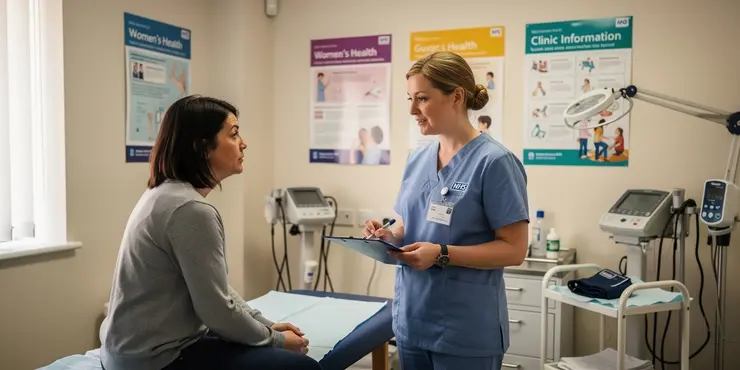
What is the womb lining test?
Relevance: 11%
-

How long is the recovery time after an appendectomy?
Relevance: 11%
Understanding Heavy Periods (Heavy Menstrual Bleeding)
What is Heavy Periods (Heavy Menstrual Bleeding)?
Heavy menstrual bleeding, also known as menorrhagia, is a common concern for many women in the United Kingdom. It is characterized by abnormally heavy or prolonged menstrual periods that can interfere with daily activities. While menstrual flow varies greatly among women, those experiencing menorrhagia may find themselves changing pads or tampons more frequently than every hour, and periods may last longer than seven days.Causes of Heavy Menstrual Bleeding
Heavy periods can result from a variety of underlying conditions, including: 1. **Hormonal Imbalances**: Imbalances between estrogen and progesterone can lead to excessive endometrial growth and heavy bleeding. 2. **Uterine Fibroids**: Non-cancerous growths in the uterus can cause significant menstrual blood loss. 3. **Polyps**: Small, benign growths on the lining of the uterus may result in heavy or prolonged periods. 4. **Adenomyosis**: This condition occurs when the endometrial tissue grows into the muscular wall of the uterus, causing heavy bleeding. 5. **Blood Disorders**: Conditions like von Willebrand disease or other clotting disorders can contribute to heavy menstrual bleeding.Symptoms of Heavy Menstrual Bleeding
Women experiencing heavy periods may notice: - Soaking through one or more sanitary pads or tampons every hour for several consecutive hours. - Needing to use double sanitary protection. - Waking up to change sanitary protection during the night. - Passing large blood clots. - Restricting daily activities due to heavy menstrual flow. - Fatigue or shortness of breath due to anemia.Diagnosis and Treatment
If you suspect you have heavy menstrual bleeding, it is important to consult with a healthcare professional. Diagnosis typically involves a pelvic exam, blood tests, ultrasound, or biopsy to identify the underlying cause. Treatment options vary based on the cause and severity of the bleeding and may include: - **Medication**: Hormonal treatments such as birth control pills, IUDs releasing progestin, or tranexamic acid to reduce bleeding. - **Surgical Procedures**: For severe cases, options such as hysteroscopy to remove polyps, endometrial ablation to destroy the lining of the uterus, or hysterectomy might be recommended. - **Lifestyle Changes**: Increasing iron intake through diet or supplements can counteract anemia caused by heavy bleeding.Living with Heavy Menstrual Bleeding
Managing heavy periods can be challenging, but support is available. In the UK, organisations such as NHS and local healthcare providers offer resources and guidance. Keeping a menstrual diary to track bleeding patterns, symptoms, and treatment effectiveness can be helpful for your healthcare provider to tailor your treatment plan. It's essential for women experiencing heavy menstrual bleeding to seek medical advice to improve their quality of life and address any underlying health issues.Understanding Heavy Periods
What Are Heavy Periods?
Heavy periods mean bleeding a lot during your menstrual cycle. Some women find it hard to do daily things because of heavy bleeding. If you have to change pads or tampons every hour or your period lasts more than seven days, you might have heavy periods.Why Do Heavy Periods Happen?
Heavy periods can be caused by different things: 1. **Hormones**: If the body has too much or too little of certain hormones, it can cause heavy bleeding. 2. **Fibroids**: These are small lumps that grow in the uterus and can make you bleed a lot. 3. **Polyps**: Little growths in the uterus can cause more bleeding. 4. **Adenomyosis**: This is when the lining of the uterus grows into the muscle, causing heavy bleeding. 5. **Blood Problems**: Some people have blood that does not clot well, which can make periods heavier.Signs of Heavy Periods
If you have heavy periods, you might: - Change pads or tampons a lot, even at night. - Use both a pad and a tampon at the same time. - Find big blood clots in your period. - Feel very tired or dizzy because you lose a lot of blood. - Have trouble doing things because of heavy bleeding.How to Know and Treat Heavy Periods
If you think you have heavy periods, talk to a doctor. They might do a check-up and some tests to find out why. Treatments can be: - **Medicine**: Some pills or treatments can help reduce bleeding. - **Operations**: For really heavy bleeding, doctors might suggest an operation to help. - **Diet**: Eating more iron-rich foods can help if you feel tired from losing blood.Living with Heavy Periods
Heavy periods can be hard, but help is out there. In the UK, the NHS and local doctors can support you. Keep a diary of your periods—write down when you bleed, how long, and how you feel. This can help doctors find the best way to help you. Women with heavy periods should get medical help to feel better and take care of their health.Frequently Asked Questions
What are heavy periods?
Heavy periods, also known as menorrhagia, refer to excessive menstrual bleeding that can interfere with daily life. This can include passing large blood clots or bleeding for more than 7 days.
What are the common symptoms of heavy menstrual bleeding?
Symptoms of heavy menstrual bleeding include soaking through one or more sanitary pads or tampons every hour for several consecutive hours, needing to use double sanitary protection, waking up to change sanitary protection during the night, and passing blood clots larger than a 10p coin.
What causes heavy menstrual bleeding?
Causes can include hormonal imbalances, uterine fibroids, polyps, adenomyosis, non-hormonal intrauterine devices (IUDs), and medical conditions such as thyroid problems, blood clotting disorders, or pelvic inflammatory disease (PID). Sometimes, the cause is unknown.
When should I see a doctor about heavy periods?
You should see a doctor if you experience heavy periods that interfere with your daily life, cause severe pain, lead you to avoid everyday activities, or if you have concerns about the amount or duration of your bleeding.
How is heavy menstrual bleeding diagnosed?
Diagnosis usually involves a medical history review, a physical examination, and possibly some tests such as blood tests, pelvic ultrasound, endometrial biopsy, or hysteroscopy.
Can lifestyle changes help manage heavy periods?
Yes, maintaining a healthy weight, managing stress, exercising regularly, and eating a balanced diet may help manage symptoms. Keeping a menstrual diary can also be useful in tracking changes and managing symptoms.
What are medical treatments for heavy menstrual bleeding?
Medical treatments include non-steroidal anti-inflammatory drugs (NSAIDs) like ibuprofen, tranexamic acid, hormonal treatments such as the combined oral contraceptive pill or progestin therapy, and the levonorgestrel intrauterine system (LNG-IUS).
Are there surgical options for treating heavy periods?
Yes, surgical options may include endometrial ablation, uterine artery embolization, myomectomy, and in severe cases, hysterectomy.
Can heavy menstrual bleeding affect fertility?
It can, especially if it's caused by conditions such as fibroids or polyps. Treating the underlying condition can often improve fertility.
Is heavy menstrual bleeding common?
Yes, heavy menstrual bleeding is a common condition affecting about 1 in 5 women in the UK.
What lifestyle changes can help manage heavy periods?
Maintaining a healthy diet, regular exercise, managing stress, and avoiding smoking can help manage symptoms. Keeping a menstrual diary to track the patterns and severity of your bleeding can also be beneficial.
Can heavy periods lead to anemia?
Yes, heavy periods can lead to iron-deficiency anemia, which can cause fatigue, weakness, and shortness of breath. It’s important to see a doctor if you suspect you have anemia.
Is it safe to use a menstrual cup with heavy periods?
Yes, menstrual cups can be used safely with heavy periods. They can hold more fluid than tampons and may need to be emptied more frequently.
Can stress cause heavy menstrual bleeding?
Stress can potentially affect menstrual cycles, leading to changes in bleeding patterns, but it’s not typically a direct cause of heavy menstrual bleeding. However, managing stress through lifestyle changes and relaxation techniques can be beneficial.
Can diet impact heavy menstrual bleeding?
A balanced diet rich in iron can help manage symptoms of heavy menstrual bleeding and prevent anemia. Some find that reducing caffeine and sugar intake can also help in managing symptoms.
What are heavy periods?
Heavy periods mean you bleed a lot during your time of the month.
Here are some things that can help:
- Talk to a doctor to get advice.
- Use pads or tampons that fit you well.
- Keep a diary of your periods to see patterns.
- Rest and drink plenty of water.
Heavy periods are when you bleed a lot during your period. This is also called menorrhagia. It can make doing normal activities hard. You might have big blood clots or bleed for more than 7 days.
What are the common signs of heavy periods?
Heavy periods are when you bleed a lot during your monthly cycle. Here are some common signs:
- Bleeding through your pad or tampon in less than an hour.
- Needing to use more than one pad at a time.
- Having to change pads or tampons during the night.
- Having periods that last more than a week.
- Passing large blood clots.
- Feeling very tired or weak.
If you think you have heavy periods, ask for help. You can talk to a doctor or a nurse. They can give you advice.
You can use a calendar to track your periods. Note how long they last and how often you need to change pads or tampons. This information is useful to share with your doctor.
Signs of heavy periods are:
- Using a lot of pads or tampons very fast.
- Using two pads to stop leaks.
- Waking up at night to change pads.
- Seeing big blood clots, bigger than a coin.
If you have these signs, talk to a doctor. They can help.
Using period tracking apps might help you keep track of your symptoms.
Why do some people bleed a lot during their period?
There are many reasons why someone might have this problem. It can be because of:
- Hormones not being balanced right.
- Lumps in the uterus called fibroids.
- Small growths called polyps.
- A condition where the lining of the uterus is too thick, called adenomyosis.
- Using a certain type of birth control in the uterus, known as non-hormonal IUDs.
- Health issues like problems with the thyroid, trouble with blood clotting, or an infection called pelvic inflammatory disease (PID).
- Sometimes, doctors don't know the cause.
If you think you have one of these issues, talk to a doctor. You can also use tools to help understand better, like asking someone to explain it, using apps to read text aloud, or looking at pictures or videos.
When should I see a doctor about heavy periods?
You should talk to a doctor if your periods are very heavy.
Here are some signs you should see a doctor:
- You have to change your pad or tampon really often.
- Your period lasts longer than a week.
- You feel very tired or weak when you have your period.
- You have pain that is really bad during your period.
If you have heavy periods, a doctor can help you. They can find out what is wrong and make you feel better.
It can also help to use tools like a period tracker app to keep track of how heavy your periods are and how long they last. This information can be helpful for the doctor.
See a doctor if your periods are very heavy. This means:
- Your periods make it hard to do things each day.
- Your periods hurt a lot.
- You stop doing your usual activities because of periods.
- You are worried about how long or how much you are bleeding.
How do doctors know if someone has heavy periods?
To find out what is wrong, doctors do a few things. They talk to you about your health history. They look at your body to check for problems. They might also do some tests like:
- Taking a small amount of your blood.
- Using an ultrasound to look at your belly.
- Taking a tiny piece from inside your womb to look at.
- Using a small camera to see inside your womb.
It's okay to have someone with you at appointments. They can help you understand what the doctor is saying.
Can changing how you live help with heavy periods?
Do you have heavy periods? This means you bleed a lot during your period. Some things you do every day can help. Here are a few tips:
- Eat healthy foods like fruits and vegetables.
- Exercise regularly, like going for a walk or playing a sport.
- Get enough sleep each night.
- Try to stay calm and not stress too much.
If heavy periods are hard for you, talk to a doctor. They can help you with more ideas. Using a calendar to track your periods can also be helpful.
Yes, staying at a healthy weight, keeping calm, doing exercise, and eating healthy food can help with the symptoms. Writing down how you feel each day can also help you see what changes and how to handle the symptoms.
What can doctors do to help with very heavy periods?
There are different types of medicine doctors use to help people feel better. Some of these medicines are:
- Pain relief medicine like ibuprofen.
- A medicine called tranexamic acid, which helps with bleeding.
- Hormone treatments like the birth control pill or another treatment called progestin.
- A tiny device that goes inside the body called LNG-IUS, which helps stop heavy bleeding.
Helpful Tips:
You can use pictures or drawings to help you remember the medicines.
Ask your doctor if you have questions about these treatments.
You can also use apps like text-to-speech to read the information out loud to you.
Can surgery help if someone has very heavy periods?
Yes, there are some surgeries that can help. These include:
- Endometrial ablation: This removes the lining of the womb.
- Uterine artery embolization: This blocks blood flow to fibroids in the womb.
- Myomectomy: This takes out fibroids from the womb.
- Hysterectomy: This removes the womb. It is only for very serious cases.
If you need help reading, you can try tools like text-to-speech that can read things out loud. You can also use apps that make the text bigger or change the colors to help you read better.
Can having a lot of bleeding during periods make it hard to have a baby?
Some people have a lot of bleeding during their periods. This can sometimes make it hard to get pregnant.
If you are worried about this, it is good to talk to a doctor. They can help you understand what is happening with your body.
Using a calendar to track your periods can help. Write down when your period starts and stops. This can help you and your doctor see if there is a problem.
If reading is hard, try audiobooks or ask someone to read with you.
Yes, it can sometimes make it hard to have a baby. This can happen if you have things like fibroids or polyps. If you fix these problems, it might help you have a baby.
Do many people have a lot of bleeding during their period?
Yes, many women have heavy periods. This means they bleed a lot. About 1 out of every 5 women in the UK have this.
How can I feel better during heavy periods?
Here are some simple things you can do to help during a heavy period:
- Eat Healthy Foods: Try to eat fruits, vegetables, and whole grains. They are good for your body.
- Stay Active: Doing gentle exercises like walking can help you feel better.
- Get Enough Rest: Make sure to sleep well at night and rest when you need to.
- Drink Water: Drink lots of water to stay hydrated.
- Use a Planner: Keep track of your period days in a calendar. This helps you be prepared.
If you need more help, ask a doctor or an adult you trust.
Eating good food, exercising, staying calm, and not smoking can help you feel better. Writing down your periods in a diary can help you see when they happen and how strong they are.
Can heavy periods make you tired or weak?
If you have heavy periods, you might feel very tired. This is because your body loses a lot of blood. Not having enough blood can make you weak. When this happens, it is called anemia.
If you feel tired all the time, tell an adult or see a doctor. They can help you feel better.
Here are some things that might help:
- Eat foods with lots of iron, like spinach or red meat.
- Take iron tablets if a doctor says it is okay.
- Rest when you feel tired.
Yes, having heavy periods can make you lose too much iron. This might make you feel very tired, weak, or make it hard to breathe. If you think you have this problem, it’s important to see a doctor.
Can I use a menstrual cup if I have heavy periods?
Yes, you can use a menstrual cup if your periods are heavy. Here are some tips:
- Make sure the cup is the right size for you.
- Empty the cup more often if needed.
You can ask a doctor or nurse if you have questions. Using pads or liners can also help keep you feeling safe.
Yes, you can use menstrual cups if your period is heavy. They can hold more blood than tampons. You might need to empty them often.
Can stress make periods heavier?
Stress can change your period. Sometimes, it can make bleeding patterns different, but stress usually doesn't cause a lot of bleeding. Doing things to relax and feel calm can help with stress.
Can what we eat affect heavy periods?
Eating healthy foods with lots of iron is good. It can help if you bleed a lot during your period. It stops you from getting too tired and weak. Cutting down on caffeine and sugar can also make you feel better.
Useful Links
This website offers general information and is not a substitute for professional advice.
Always seek guidance from qualified professionals.
If you have any medical concerns or need urgent help, contact a healthcare professional or emergency services immediately.
Some of this content was generated with AI assistance. We’ve done our best to keep it accurate, helpful, and human-friendly.
- Ergsy carfully checks the information in the videos we provide here.
- Videos shown by Youtube after a video has completed, have NOT been reviewed by ERGSY.
- To view, click the arrow in centre of video.
- Most of the videos you find here will have subtitles and/or closed captions available.
- You may need to turn these on, and choose your preferred language.
- Go to the video you'd like to watch.
- If closed captions (CC) are available, settings will be visible on the bottom right of the video player.
- To turn on Captions, click settings .
- To turn off Captions, click settings again.
More Items From Ergsy search
-

Heavy periods (heavy menstrual bleeding)
Relevance: 100%
-

Irregular periods - BSL
Relevance: 33%
-

Can the test be performed during my menstrual period?
Relevance: 33%
-

What you need to know about irregular periods
Relevance: 30%
-

Can I use Ibuprofen for menstrual pain?
Relevance: 27%
-

What should I do if I start bleeding during early pregnancy? | NHS
Relevance: 27%
-

What should I do if I experience severe pain or bleeding after the test?
Relevance: 24%
-
Bleeding from the bottom rectal bleeding
Relevance: 24%
-

Bleeding from the bottom rectal bleeding
Relevance: 24%
-

Will the test affect my menstrual cycle?
Relevance: 23%
-

How to deal with period pain | NHS
Relevance: 22%
-

Post Menopausal Bleeding Clinic | A Guide to What Happens at An Appointment
Relevance: 21%
-

Period pain (dysmenorrhoea) - BSL
Relevance: 21%
-

What should I avoid doing during the recovery period?
Relevance: 21%
-

How to deal with period pain | NHS
Relevance: 20%
-

Are there any risks associated with the womb lining test?
Relevance: 20%
-

What is the Womb Lining test?
Relevance: 19%
-

Having a hysteroscopy as an outpatient (English)
Relevance: 19%
-

What is Anaemia (iron deficiency)?
Relevance: 19%
-

What happens after a womb lining test?
Relevance: 18%
-

How to deal with period pain | NHS
Relevance: 17%
-

How to deal with period pain | NHS
Relevance: 17%
-

Finding out about Fibroids - information for patients
Relevance: 16%
-

Why is a womb lining test performed?
Relevance: 15%
-

How to treat a nosebleed | NHS
Relevance: 15%
-

Are there risks associated with a womb lining test?
Relevance: 15%
-

What is the notice period for redundancy?
Relevance: 14%
-

How should I prepare for a womb lining test?
Relevance: 13%
-

Is a womb lining test painful?
Relevance: 13%
-

What causes iron deficiency anemia?
Relevance: 13%
-

Has the notice period for eviction changed?
Relevance: 13%
-

Is the womb lining test painful?
Relevance: 12%
-

How long is the incubation period for the Marburg virus?
Relevance: 12%
-

What is the grace period for the penalty point system?
Relevance: 12%
-

What foods are best to eat during a heatwave?
Relevance: 12%
-

What happens when the introductory APR period ends?
Relevance: 12%
-

What causes sewage pollution on UK beaches?
Relevance: 11%
-

What is the minimum service period to qualify for firefighter pension benefits?
Relevance: 11%
-

What is the womb lining test?
Relevance: 11%
-

How long is the recovery time after an appendectomy?
Relevance: 11%


